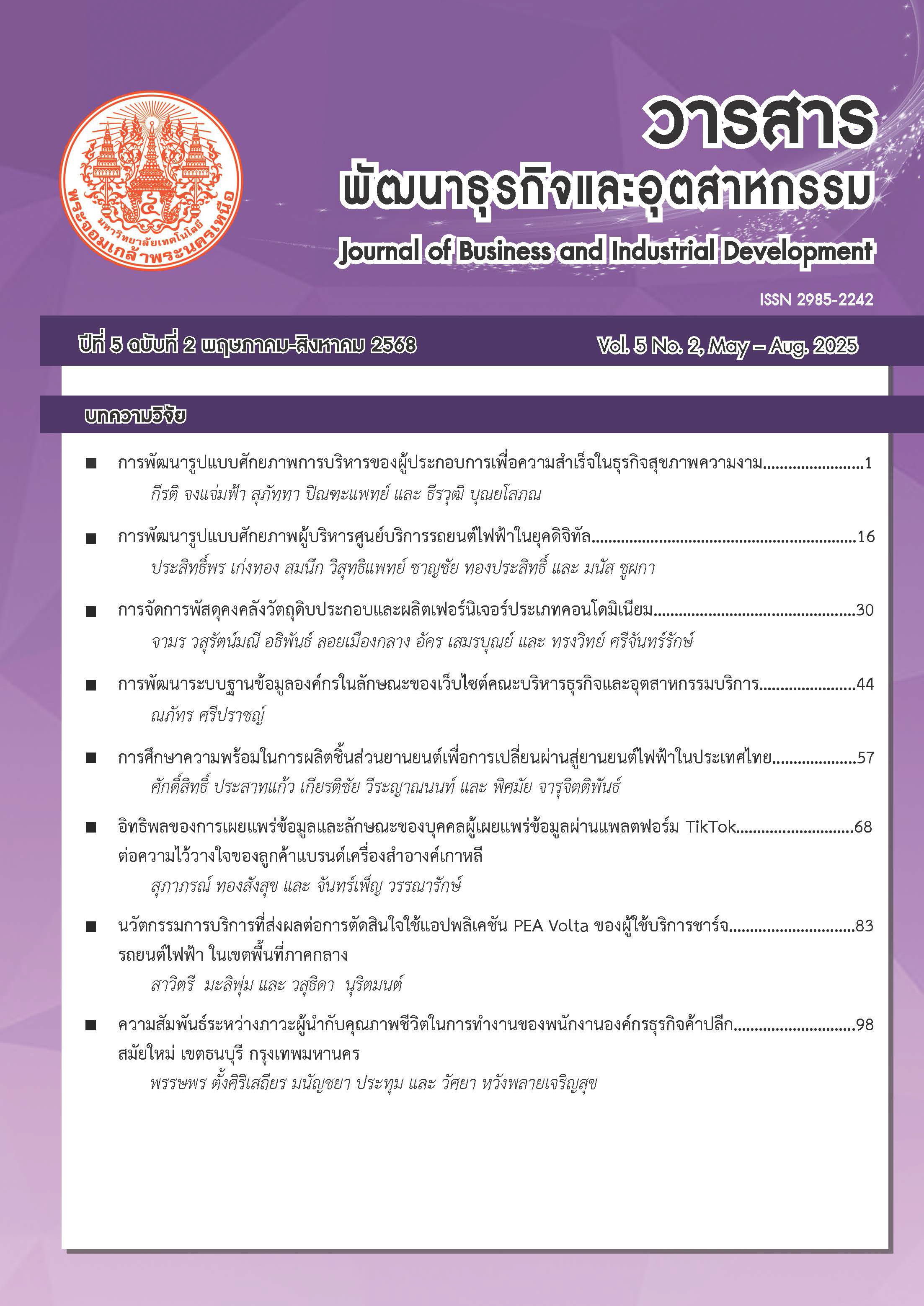The Study to Readiness of Automotive Parts Production for Transition to Electric Vehicles in Thailand
Keywords:
Readiness of automotive parts production, Readiness of management, Readiness of transition, Automotive parts manufacturing, Electric VehiclAbstract
This research aimed to study the production management factor and transition readiness factors influencing the readiness of automotive parts production for the transition to electric vehicles in Thailand. The study utilized a sample from automotive parts manufacturers in Thailand, all of whom held supervisory positions or higher and had at least five years of experience of 266 representatives. The majority of the representatives were male, 188 people (70.70 percent), 125 people (47.00 percent) were aged 41–50 years, 114 people (42.90 percent) held managerial positions, 219 people (82.30 percent) held master's degrees, 111 people (41.70 percent) were third-level automotive parts manufacturers, there are more than 200 employees, 112 people (42.10%), have registered capital less than 50 million baht, 98 people (36.80%), and have been in business for more than 15 years, 168 people (63.20%). Data was collected using a questionnaire, and statistical analysis methods included mean, standard deviation, and Multiple Regression Analysis. The findings revealed that 1) production management factors and transition readiness factors—comprising 11 key factors—explained 85.7% of the overall variation in the readiness of automotive parts production (Adjusted R² = .857). Among these, the machinery and equipment and the transition-related had a statistically significant impact on overall readiness at the .01 level. Additionally, the raw material, situation adaptation, and transition control significantly influenced readiness at the .05 level. 2) when ranking the independent variables based on their influence, the transition-related had the highest impact (Beta = .338), followed by the machinery and equipment (Beta = .142) and the situation adaptation (Beta = .116). The knowledge management and innovation had the least influence (Beta = .004). These findings highlight the critical elements that should be prioritized to enhance the readiness of Thailand’s automotive parts industry for the transition to electric vehicle production.
References
Thailand Development Research Institute. (2022, August 25). Clean Energy Needs Far Clearer Policy. TDRI. https://tdri.or.th/en/2022/08/clean-energy-needs-far-clearer-policy/ (in Thai)
Office of the National Economic and Social Development Council. (2022). The thirteenth National Economic and Social Development Plan (2023–2027). NESDC. https://www.nesdc.go.th/en/the-national-economic-and-social-development-plan/the-thirteenth-plan-2023-2027/
GSB Research Center. (2023). Electric Vehicle Supply Chain. Government Savings Bank.https://www.gsb.or.th/published-works/economic-and-business-research/12358/
Puey Ungphakorn Institute for Economic Research. (2020). Automobile and Automotive Parts Industry. PIER. https://www.pier.or.th/en/article/automobile-and-automotive-parts-industry/(in Thai)
Voss, C. A. (1992). Manufacturing Strategy: Process and Content. Chapman & Hall.
Drucker, P. F. (1973). Management: Tasks, Responsibilities, Practices. Harper & Row.
Meleis, A. I., Sawyer, L. M., Im, E. O., Messias, D. K. H., & Schumacher, K. (2000). Experiencing Transitions: An Emerging Middle-Range Theory. Advances in Nursing Science, 23(1), 12–28. https://doi.org/10.1097/00012272-200009000-00006
Thai Automotive Institute. (2023). Thailand Automotive Industry: Facts and Figures 2022. TAI.http://www.data.thaiauto.or.th/images/PDF/Navigator/Thai_Automotive_Industry-Facts_and_Figures_2022.pdf
Hair, J. F., Black, W. C., Babin, B. J., & Anderson, R. E. (2010). Multivariate Data Analysis: A Global Perspective (7th ed.). Pearson Education.
Thatchakorn, P. (2019). The survival of the Thai Auto Parts Industry in the EEC [Unpublished master’s thesis]. Burapha University. (in Thai)
Atichat, R. (2019). The Effect of Disruptive Technology in Thai Automotive Industry. Burapha University. (in Thai)
Chatkaew, H. (2012). Innovation Management, Management Skills, And Production Technology in The Competitive Potential of Thai Auto-Part Enterprises [Unpublished master’s thesis]. Suan Sunandha Rajabhat University. (in Thai)
Khanittha, S. (2020). The Adaptation of Automotive Parts Manufacturing Enterprises to The Transformation from Internal Combustion Engines to Electric Vehicles [Unpublished independent study]. Thammasat University. (in Thai)
Downloads
Published
How to Cite
Issue
Section
License
Copyright (c) 2025 Journal of Business and Industrial Development

This work is licensed under a Creative Commons Attribution-NonCommercial-NoDerivatives 4.0 International License.





